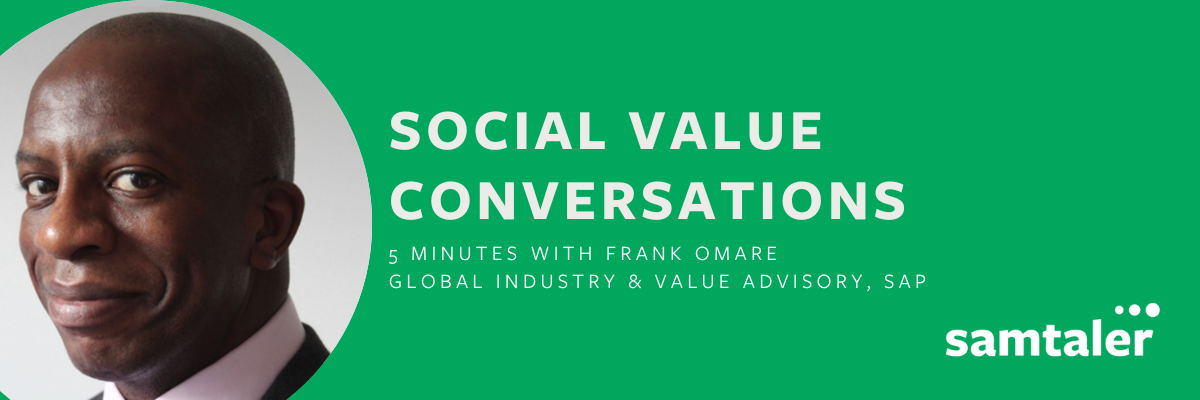Frank Omare, Global Industry & Value Advisory, SAP
Tell us about your job?
I work for SAP, one of the world’s leading software solutions and business applications companies. 77% of the world’s business transactions are made using an SAP system which means we are well placed to help support people make better business decisions. My role is to work with customers to help them understand how we can help them achieve their sustainability-related goals.
You specialise in sustainable procurement – what does that mean?
Sustainable procurement is about looking at an organisation’s ‘source to pay’ processes and seeing how they can be delivered in a way that has a positive impact on society and the environment. We also work with businesses to align their procurement processes with the UN’s 17 Sustainable Development Goals.
Is there more to sustainable procurement than mitigating negative impact?
Many years ago, sustainable procurement was about compliance, but today it has a more positive connotation. Yes, it’s still about risk mitigation, but it’s also about looking at how organisations can be a force for good and give something back at the same time as sourcing products and services. It’s not just about getting things at the lowest possible price.
Are you finding there is an increased appetite for sustainable procurement?
Definitely. The pandemic has shown us that lots of global supply chains are very complex and not very resilient. Lots of supply chains collapsed and organisations discovered they didn’t really know who their suppliers were or the risks involved.
As organisations put together recovery plans they are recalibrating their global supply chains to look at where they can source more locally so that in the event of something like this happening again there will not be the same sort of risk and disruption. This is where there is a real opportunity to integrate social enterprises into the supply chain as they can provide local expertise, local knowledge and shorten the lead time for various products and services at the same time as having a positive social impact.
What are the barriers to persuading businesses that sustainable procurement is a good idea?
Sustainability and ethical issues haven’t traditionally sat within the remit of procurement, but people are now realising that procurement is the business function best placed to make a difference when it comes to solving some of the world’s biggest problems. They are sourcing the suppliers, negotiating contracts, managing supplier performance and pushing suppliers to be more innovative. For the first time, we see procurement professionals recognising their role in making the world fairer, more inclusive and sustainable.
Can you talk about SAP’s journey into sustainable procurement?
It’s important that we walk the walk, as well as talk the talk on sustainable procurement, which is why we have plans in place to become fully carbon neutral by 2025, and we have also set ourselves our ‘5 &5 by 25’ global target where by 2025 we aim to be spending 5% of our global spend with social enterprises and another 5% with diverse suppliers.
Can you give us some examples of the things you buy from social enterprises and diverse suppliers?
Social enterprises are known for soft facilities management services like cleaning, catering and reception services, as well as indirect products such as office equipment, office stationery and refreshments. Belu water is one company we work with to provide all the water in SAP offices in the UK.
We also recently transitioned to using Change Please coffee rather than Costa Coffee
What’s great about this example is that before we made the change, we arranged some blind taste tests with our employees to ensure the quality of the coffee was going to be just as good. There’s a misconception that if you move to a social enterprise or a diverse supplier, the quality of the product or service will suffer, and that’s not true. A lot of these businesses operate for a profit, and they can only do that if they have a good quality product or service.
How can other companies get involved in sustainable procurement?
Start small. Pick one category of spend, prove it works - that quality won’t suffer and it doesn’t cost you more - then once you’ve done that you can look at other categories of spend where you can introduce this type of thinking.
Also, as organisations look to strike a better balance between global sourcing and local sourcing look at where you can integrate local social enterprises and diverse businesses into your supply chain. One of the quickest ways to do this is by looking at high volume and low-cost products and services because these budgets are often managed by local business units rather than central procurement.
Finally, at SAP we have our ‘5 & 5 by 25’ target, but it’s not trademarked or copyrighted. If you don’t already have these sorts of plans in place then by all means copy what we’re doing! The most important thing is that we are all taking steps to integrate these types of suppliers into our supply chains and recognising the role of procurement in being a force for good.
How we can help
At Samtaler, we understand the importance of your social value commitment. You’re here because you care about the impact your business has on society and want to be better. We want you to succeed, and we know from experience that achieving social value requires skill, strategy, and support.
To find out how we can help send an email to hello@samtaler.co.uk
Sign up to The Social Value Files for inspiration and practical ideas to create social value for your business.
If you liked this post please share.



